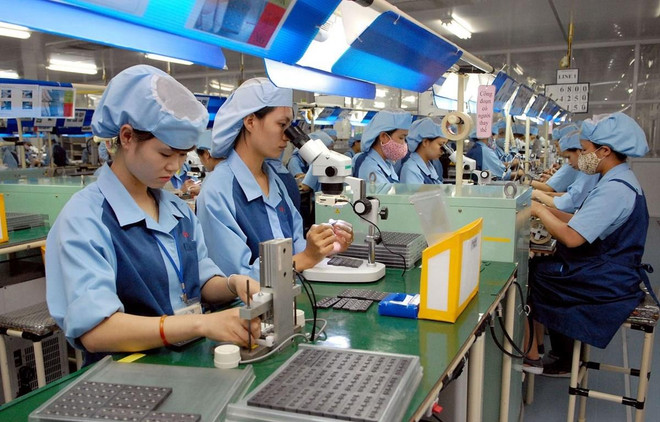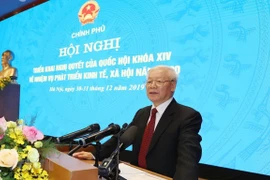 Private enterprises have enough experience and abundant resources, and can operate flexibly to carry out major projects, helping the Government reduce public debt while better tapping private capital sources. (Illustrative image. Source: VNA)
Private enterprises have enough experience and abundant resources, and can operate flexibly to carry out major projects, helping the Government reduce public debt while better tapping private capital sources. (Illustrative image. Source: VNA)
Hanoi (VNA) – Breakthrough changes in mechanisms, policies are needed forthe private economic sector’s development, experts said.
Morethan 30 years after the launch of Doi Moi, the private economic sector hasemerged as one of the important driving forces of the national economy,participating increasingly deeper and more extensively into most economicfields, contributing significantly to the national budget and creating jobs formillions of workers.
[Private economic sector – important driver of economy]
NationalAssembly deputy Nguyen Nhu So of Bac Ninh province cited statistics that showedthe non-State sector invested 624.6 trillion VND (approximately 27 billion USDon current exchange rate) into the economy in the first 9 months of 2019, up16.9 percent year on year, and the highest among all economic sectors. Theprivate economic sector also accounts for more than 40 percent of the GDP andcreates 1.2 million jobs each year.
However,the NA deputy said the sector’s development is mainly based on its ownpotential without any drastic change.
Henoted that despite Vietnam’s improvement in the World Economic Forum’scompetitiveness rankings to the 67th place in 2019, the number ofenterprises that suspended operation pending dissolution in the first ninemonths of the year rose 6.3 percent.
“Thisfact prompts the question that whether the business environment is really idealfor the development of private enterprises,” the deputy said. He saidunofficial costs and too many regulations put a great burden on enterprises.
“Theremust be breakthrough changes in terms of mechanisms and policies to removeobstacle to the private economic sector’s development,” he said.
[Clear policies – launching platform for private economy]
TheNA deputy suggested that the State should support the sector in management,land, credit and human resources.
Accordingto Chairman of the Vietnam Chamber of Commerce and Industry (VCCI) Vu Tien Loc,there is a major contradiction in the private economic sector. He said the morethan 700,000 official private enterprises contribute only one quarter of thesector’s 40 percent-share in the GDP, and the remaining three quarters arecontributed by more than 5 million business households.
“Noother market economy has such a big semi-official and unofficial sector,” Locsaid. He said individual business households are essentially a kind of microenterprises, but they do not have any clear legal status, resulting in limitedbusiness rights. The State’s management of those households is not transparent,and they do not receive any support.
“Wecannot solve this issue by abolish them or force them to transform intoenterprises. Instead we should give them a legal status by including them intothe regulating scope of the Law on Enterprises, ensuring they are treatedequally with micro, small and medium-sized enterprises,” Loc said.
Chairmanof the BRG group Nguyen Thi Nga was of the view that institutional reform isthe key for the private economic sector to grow and establish their role andposition.
Shestressed that the Government should ensure equal competition among, as well asgive equal incentives to, all economic sectors.
Thebusiness woman urged allowing private enterprises to participate in fieldswhere State is still holding monopoly such as railway, electricity transmissionand aviation infrastructure.
“Privateenterprises have enough experience and abundant resources, and can operateflexibly to carry out major projects, helping the Government reduce public debtwhile better tapping private capital sources,” Nga said.
Sheurged the Government to further simplify administrative procedures, saying thatthere are still many problems with those procedures, causing difficulties andwaste of time and resources for enterprises while creating loopholes fornegative phenomena.
Alongwith the development of the private economic sector, many private enterprisesand groups have emerged, making their names known in the world. A suitablelegal framework is needed for those economic groups so as to create thefavourable conditions for the rise of more strong groups while keeping alongthe Party’s guideline.
Chairmanof the Vietnam Association of Foreign-invested Enterprises Nguyen Mairecommended that the State should devise policies to assist economic groups inbuilding and developing trademarks, establishing their position in the worldmarket hi-tech agriculture, industry and modern services.
Healso urged completing laws relating to capital mobilization, accumulation andconcentration, thus creating a legal corridor for economic groups’ operation.
Atthe Vietnam Private Economic Sector Forum 2019, Prime Minister Nguyen Xuan Phucaffirmed that he and the Government always encourage startups, nurture thedevelopment of private enterprises.
Vietnam’seconomy can only be strong when there are enterprises capable of competing inthe global market, the PM said./.





























